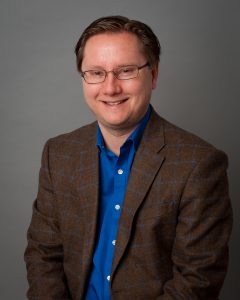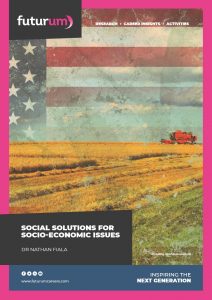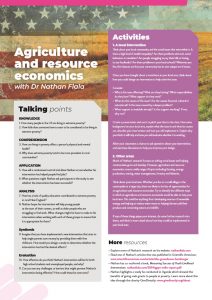Social solutions for socio-economic issues
Extreme poverty is a global issue that affects hundreds of millions of people. Even in developed countries, many people struggle to make ends meet. In New England, a region in Northeastern USA, many rural communities face high levels of poverty. In large part, this is due to high unemployment rates and a lack of suitable education and training programmes. Dr Nathan Fiala from the University of Connecticut is working with these rural communities to help solve this problem and reduce poverty rates.
TALK LIKE AN AGRICULTURE AND RESOURCE ECONOMIST
Causality — the concept of cause and effect
Extreme poverty — severe lack of access to basic human needs such as food, water, shelter, healthcare and education
Poverty line — the minimum level of income a person needs to afford necessities (which will vary depending on country)
Randomised control trial — a study in which an intervention is randomly assigned to people within a population. A control group is also randomly selected, and the two groups are studied over time to determine the effect of the intervention
Rural communities — small villages or settlements that are located in the countryside
Skills gap — a disparity between the skills that employers are searching for and the skills that potential employees have
Over 700 million people around the world are currently living in extreme poverty, surviving on an income of less than $2.15 a day – about the price of a tube of Pringles. For people trying to get by on such a small amount, life can become a real fight for survival.
Extreme poverty is a global problem. Even in wealthy countries, millions of people live below the poverty line. In the US, for example, almost 40 million people are living in extreme poverty. How is it that America, the home of Hollywood, Wall Street and The American Dream, is also the home of so many people who are struggling to survive?
The answer is not a simple one. The causes of extreme poverty, and extreme inequality, in the US are numerous, varied and complex, and many people have dedicated their careers to studying them. Even so, studying the causes of extreme poverty is just the first step on a long journey to eradicating the problem.
The next step involves implementing schemes and programmes that can support people living in poverty and help them to achieve financial security. Dr Nathan Fiala, an agriculture and resource economist from the University of Connecticut, is leading a new programme in the region of New England, where his university is based. He hopes that this programme will help to encourage economic growth in the poverty-stricken communities of rural New England, so that the people who live there can attain a better quality of life.
Life in New England
“Extreme poverty is common across the US,” says Nathan. “New England is no different.” Poverty is particularly prevalent in rural communities in the north of the region. Big cities, like Boston in Massachusetts, tend to be the economic heartbeat of a region. In them, it can be much easier to find well-paying jobs, affordable housing and educational opportunities. In rural communities, on the other hand, access to these basic needs can be harder to come by.
Rural communities are often cut off from much of the money that moves around in the big cities. As well as a lack of jobs, housing and education, these communities also tend to lack good quality infrastructure, such as roads and public transport, access to health care, and support from government programmes. Many such programmes are designed to tackle poverty in urban environments, and they are not always appropriate for these rural communities.
How is Nathan hoping to fight extreme poverty in rural communities?
One of the biggest causes of poverty in rural New England is unemployment. Many people in rural communities have less access to quality education and there are fewer job opportunities in their local areas. On top of this, many of the jobs that are available require skills and expertise that many people in these communities do not have. This is known as a skills gap – an imbalance between the skills than an employer needs and the skills that potential employees have.
Nathan’s project involves trying to get a clearer picture of these skills gaps so that he can identify exactly which kinds of skills local employers are looking for, and which kinds of skills local people are lacking. Nathan hopes that by identifying and narrowing these skills gaps, he will be able to help these rural communities lift themselves out of poverty.
How will Nathan identify these skills gaps?
Nathan will work with local business groups and associations to understand which jobs they are struggling to fill and pinpoint which skills the applicants for these jobs are lacking. He will also work with these associations to determine what their employment needs will be in the future, and which skills their workforces will need to cultivate.
Another way in which Nathan is collecting data for his project is via an online job postings website called Burning Glass. By analysing the job adverts on this site, Nathan will be able to understand which skills are needed in which places, and which skills are not being developed enough by local education and training programmes.
How can the skills gaps be closed?
Reference
https://doi.org/10.33424/FUTURUM407
Nathan will work to catalogue the existing training programmes within the region, at both high schools and higher education institutions like universities and colleges. There are also training opportunities within the business and industry communities themselves, so Nathan will talk members of these communities to get a full picture of all the training that is available to potential employees.
Once these training opportunities have been identified, Nathan will be able to identify which sought after skills are not being supported by training programmes. He can then work with educational institutions and business groups to encourage them to develop the necessary training.
Nathan will also communicate the findings of his projects to people in the local area who are unemployed or looking for new, higher-skilled jobs. He will be able to point these people in the right direction and help them find the training programmes that will help them gain the skills that they need. Nathan will also work with local high schools to help students understand which skills they might need to develop to begin their journey along their chosen career path.
How will Nathan know whether the programme is working?
Once Nathan has finished collecting data on the local skills gaps and training opportunities, he will share his findings with schools and young people in the local area. His plan is to conduct a randomised control trial to determine whether having access to this information will influence what types of further education young people pursue.
A randomised control trial is a type of experiment that aims to evaluate the impact of a particular intervention. In this case, giving young people access to information about the skills gaps and training in their local area. The study group (those who are given access to the intervention) and a control group (those who are not) are chosen randomly from a wider population – in Nathan’s investigation, young people in rural New England. The two groups are then studied over a period of time to understand the impact of the intervention on the study group.
The feature that separates randomised control trials from other types of experiment is the random assignment of the study and control groups. This makes them particularly robust and allows them to provide powerful insights into questions of causality. Through these trials, researchers can confirm whether any changes to the study population are being caused by the intervention, as opposed to other variables.
What will the long-term impacts of Nathan’s programme be?
Nathan hopes that his project will help to create sustainable economic growth by increasing access and availability to training, and by upskilling local people to fill employers’ needs. In doing so, the project will help rural communities to climb out of the poverty that they are currently experiencing.
Living in poverty can have an enormous impact on a person’s health and well-being. Without a stable income, it can be hard to lead a healthy lifestyle, eat nutritious food and look after your mental health. If Nathan can help people in these rural communities find better jobs and escape poverty, he will also be helping them to live longer, healthier lives.
 Dr Nathan Fiala
Dr Nathan Fiala
Department of Agricultural and Resource Economics, University of Connecticut, USA
Field of research: Agriculture and Resource Economics
Research project: Identifying existing employment gaps faced by rural New England employers
Funder: US Department of Agriculture’s National Institute of Food and Agriculture (USDA NIFA)
About agriculture and resources economics
In its broadest sense, the field of agriculture and resource economics looks at how agricultural lands and natural resources are managed, and how this management can be improved. For example, a researcher in this field might investigate how farms can increase the amount of food they produce, whilst also minimising their contributions to climate change. Other researchers might study mining, energy production (including renewable energy) or water management.
Much of Nathan’s research has been focused on the social impacts of economics and resource management. He has worked with impoverished communities all over the world, investigating different ways of helping them lead healthier, more prosperous lives.
For example, in Zambia, he conducted an experimental study that provided free bicycles to primary school girls. Two major challenges for young girls attending school in Zambia are the distances that they have to travel to get to school, and their safety as they make these journeys. Nathan found that providing these girls with bicycles made it much easier for them to attend school, leading to higher levels of aspiration and self-esteem.
Other projects that Nathan is currently working on include studies looking at trust within homeless communities in Connecticut, how better cooking stoves can help communities in Rwanda, and the effect of private e-savings accounts on women in Tanzania.
Nathan’s research spans countries and includes a whole range of social resources and interventions. The common thread throughout all of Nathan’s work is his desire to help people in poverty-stricken communities to lead better lives.
Pathway from school to agriculture and resource economist
• Studying mathematics and statistics in school is particularly important. It is also useful to understand how people behave and interact with their environments, so subjects like human geography and sociology could be useful.
• Read books on related issues to ensure that you have a good grasp of the field. Nathan recommends Off the Books: The Underground Economy of the Urban Poor by Sudhir Venkatesh, Not in My Neighbourhood: How Bigotry Shaped a Great American City by Antero Pietila and Pedigree: How Elite Students Get Elite Jobs by Lauren A. Rivera.
• Agriculture and resource economics is usually offered as a postgraduate degree. For your undergraduate degree, you should choose a course in a related field such as geography, sociology or economics.
Explore careers in agriculture and resource economics
• Work as an agriculture and resource economist can be highly varied. You might want to work in farming, fisheries, mining, forest management, renewable energy, water management or many other areas. Getting a degree in agriculture and resource economics can open the door to many career opportunities including: farm management, economic consultancy, policy analysis and loan officiating.
• Nathan’s work focuses on community action and the social aspects of growth and development. As an agriculture and resource economist, you will get the opportunity to meet and work with all kinds of people and communities.
• There are many journals that are dedicated to research in agriculture and resource economics. Through these journals, you can explore the latest developments in the field. Some journals include: The Journal of Agricultural and Resource Economics and the Australian Journal of Agricultural and Resource Economics.
Meet Nathan
What inspired you to pursue a career in this field?
I have been interested in economic development since I was 14. I grew up in Saudi Arabia and had the opportunity visit many countries as a child. My trip to Kenya at the age of 5 has stuck with me my entire life. I remember very vividly the poverty that I saw, along with the hard work people were doing to keep going.
What does your work as a consultant involve?
Alongside my academic research, I also work as a consultant, supporting organisations to help them to understand the impact of the programming that they do. It is often hard to determine if the things that an organisation does have the positive effects on individuals they are aiming for.
What do you enjoy about conducting research abroad?
I enjoy trying to understand what types of programming are best to improve the lives of people living in poverty around the world. I have been lucky enough to conduct research all over the world in places like Uganda, Tanzania, Kenya, Zambia, Swaziland, Zimbabwe, Ghana, Myanmar, India and Paraguay.
How do you decide which issues to work on?
I go where the need is. For example, a team at Harvard University reached out to me about working in New York on housing evictions. Generally, organisations reach out to me to help them better understand the effects of what they’re doing.
What are your proudest career achievements so far?
My work in Uganda, which has helped to show that people living in poverty can make good use of cash grants. There was concern that they would waste the money, but they do not.
Nathan’s top tips
1. It is important to get to know the people you are trying to help, so you can really understand them and their needs.
2. Working on your mathematics skills will set you up well for a career in advanced economics.
3. Data analysis skills are often in high demand, so working on these is a good idea.
Do you have a question for Nathan?
Write it in the comments box below and Nathan will get back to you. (Remember, researchers are very busy people, so you may have to wait a few days.)






